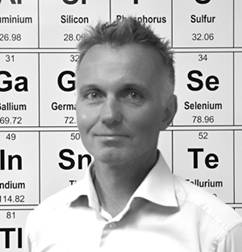Many-body physics in real space
Date: 2018-11-19
Time: 15:00
Venue: A234
Speaker: Prof. Werner Hofer
Newcastle University, UK.
Abstract:
An extended electron model fully recovers many of the experimental results of quantum mechanics while it avoids many of the pitfalls and remains generally free of paradoxes [1-3]. The formulation of the many-body electronic problem here resembles the Kohn-Sham formulation of standard density functional theory. However, rather than referring electronic properties to a large set of single electron orbitals, the extended electron model uses only mass density and field components, leading to a substantial increase in computational efficiency. To date, the Hohenberg-Kohn theorems have not been proved for a model of this type, nor has a universal energy functional been presented. In this talk, we address these problems and show that the Hohenberg-Kohn theorems do also hold for a density model of this type. We then present a proof-of-concept practical implementation of this method and show that it reproduces the accuracy of more widely used methods on a test-set of small atomic systems, thus paving the way for the development of fast, efficient and accurate codes on this basis [4].
References:
[1] Werner A Hofer, Unconventional Approach to Orbital-Free Density Functional Theory Derived from a Model of Extended Electrons, Foundations of Physics 41, 754-791 (2011).
[2] Werner A Hofer, Heisenberg, uncertainty, and the scanning tunnelling microscope, Frontiers of Physics 7, 218-222 (2012).
[3] Thomas Pope and Werner A Hofer, Spin in the extended electron model, Frontiers of Physics 12, 128503 (2017).
[4] Thomas Pope and Werner A Hofer, A two-density approach to the general many-body problem and a proof of principle for small atoms and molecules, Frontiers of Physics (2018) in press, preprint at: arxive: 1801.06242
Biography:
 Professor Werner Hofer is Professor of Chemical Physics, with expertise in theoretical condensed matter physics, physical chemistry, and electron theory, including fundamental aspects of quantum mechanics.
Professor Werner Hofer is Professor of Chemical Physics, with expertise in theoretical condensed matter physics, physical chemistry, and electron theory, including fundamental aspects of quantum mechanics.
He holds a master’s degree in engineering physics from the University of Technology, Vienna, and a PhD in Condensed Matter Theory from the same University. Prof. Hofer is internationally known for his work on the nanoscience of surfaces and interfaces and has worked for nearly twenty years in this field with international collaborators in Canada, the US, China, and Europe. He is also known for his work on fundamental physics, in particular electron theory and foundational aspects of quantum mechanics, which he considers an outdated and contradictory theoretical framework.
From 1999 to 2002 he was research assistant and research associate at University College London, from 2002 to 2014 he was Lecturer, Reader (2005) and Professor (2006) in the Department of Chemistry at the University of Liverpool. He was awarded a competitive Royal Society University Research Fellowship in 2003, which he held until 2011. From 2007 to 2013 he was an international member of the Canadian Institute for Advanced Research, participating in research on nanoelectronics. Since 2014 he is Professor of Chemical Physics at Newcastle University. His editorial roles include member of the editorial board of Journal of Physics (2005-2008), Editor of the Elsevier journal Surfaces and Interfaces (2016-2017), and Associate Editor-in-Chief of Frontiers of Physics (Chinese Academy of Sciences and Springer, since 2016). He publishes regularly in high-impact journals like Nature, Nature Chemistry & Nanotechnology, Angewandte Chemie, Reviews of Modern Physics, Physical Review Letters, Nano Letters, and the Journal of the American Chemical Society. In 2010 he became Founding Director of the Stephenson Institute for Renewable Energy at Liverpool University, which he led until 2014, building up the institute to its current strength of 60 researchers and a portfolio of £30m in research funding. Part of this role included planning and supervising the build of new laboratories and offices containing 2000 square meters. The institute’s contribution in the national research evaluation in 2014 of eight researchers was a major factor in the success of Chemistry in Liverpool (top unit in the country with respect to 3* and 4* outputs, 11th in the country if all science and engineering units are considered). In 2014 he became Dean of Research and Innovation in the Faculty of Science, Agriculture, and Engineering, contributing substantially to the eventual restructuring of the Faculty into four, instead of ten schools in 2017. He resigned as a Dean with effect from June 2018 to focus on his research, in particular the development of new methods to efficiently simulate systems composed of millions of atoms.
邀请人:杜世萱 研究员,电话:9823


